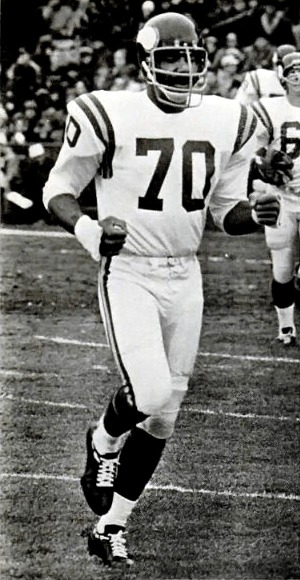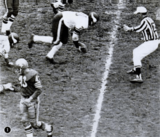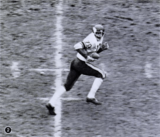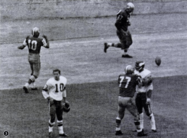Jim Marshall (defensive end) facts for kids
 |
|||||||||||||||||
| No. 80, 70 | |||||||||||||||||
|---|---|---|---|---|---|---|---|---|---|---|---|---|---|---|---|---|---|
| Position: | Defensive end | ||||||||||||||||
| Personal information | |||||||||||||||||
| Born: | December 30, 1937 Wilsonville, Kentucky, U.S. |
||||||||||||||||
| Height: | 6 ft 4 in (1.93 m) | ||||||||||||||||
| Weight: | 248 lb (112 kg) | ||||||||||||||||
| Career information | |||||||||||||||||
| High school: | East (Columbus, Ohio) |
||||||||||||||||
| College: | Ohio State (1956–1958) | ||||||||||||||||
| NFL Draft: | 1960 / Round: 4 / Pick: 44 | ||||||||||||||||
| Career history | |||||||||||||||||
|
|||||||||||||||||
| Career highlights and awards | |||||||||||||||||
|
|||||||||||||||||
| Career NFL statistics | |||||||||||||||||
|
|||||||||||||||||
| Player stats at PFR | |||||||||||||||||
James Lawrence Marshall (born December 30, 1937) is an American former professional football player who was a defensive end in the National Football League (NFL) for 20 seasons, primarily with the Minnesota Vikings. He played college football for the Ohio State Buckeyes, before leaving to play for the Saskatchewan Roughriders of the Canadian Football League (CFL). He was selected by the Cleveland Browns in the fourth round of the 1960 NFL draft.
Marshall recovered an NFL record 29 opponents' fumbles, including his 1964 "wrong-way run", a play in which he recovered a fumble and returned it 66 yards in the wrong direction into his own end zone, where he threw the ball out of bounds, resulting in a safety for the San Francisco 49ers. He owns the career records for most consecutive starts (270) and most games played (282) by a defensive player.
Contents
Early life
Marshall was born in Wilsonville, in Boyle County, Kentucky. His family moved to Columbus, Ohio when he was five, but he would spend summers in Wilsonville. He attended Columbus East High School. He was on the football team that was twice undefeated, and was selected All-State, All-City and a high school All-American.
Football career
College
Marshall played college football for the Ohio State Buckeyes (1957-58). In 1958, he was selected All-American at tackle. He was also a track star at Ohio State, setting school records at discus and shot put in 1958.
In 1957, the Buckeyes were 9–1 overall, 7–0 in the Big Ten Conference, and ended the season ranked second to Auburn in the Associated Press (AP) national poll, and ranked first by UPI and the Football Writers Association of American. Along with Marshall, the team included other future NFL players like Jim Houston, Dick LeBeau, and Bill Jobko. Marshall played in the 1958 Rose Bowl (January 1, 1958), which the Buckeyes won 10–7 over Oregon.
The 1958 Buckeye team ended the season ranked 8th in the AP poll. In a November 1958 game against Purdue, Mashall had a 25-yard interception return for a touchdown, and a 22-yard return of a blocked punt for another touchdown; Ohio State's only two touchdowns in the game. Jim Houston had blocked the punt Marshall recovered, and deflected the pass Marshall intercepted.
In 1978, Marshall was inducted into the Ohio State Hall of Fame.
Canadian Football League
Marshall left school before his senior year, primarily for financial reasons, and played for the Saskatchewan Roughriders of the Canadian Football League (CFL) in 1959. The Roughriders had obtained Marshall's CFL rights from Ottawa in April 1959. Marshall typically played defensive line, but was used on offense as well. In one game he caught a touchdown pass against the Winnipeg Blue Bombers, who were coached by Bud Grant, Marshall's future head coach on the Vikings. After one year, he was traded to the Cleveland Browns in an NFL–CFL transaction, being swapped for Bob Ptacek, who had played against Marshall in college at the University of Michigan. Cleveland's Paul Brown had selected Marshall in the fourth round of the 1960 NFL draft, obtaining the rights to sign him.
National Football League
Marshall played the 1960 season with the Browns. He contracted encephalitis during military training before the 1961 season, and was seriously ill, even being placed in an induced coma to save his life. He was traded along with five other players (including fellow defensive lineman Paul Dickson) to the expansion Minnesota Vikings in exchange for two draft picks in the 1962 NFL draft. He played from 1961 to 1979 with the Vikings and finished with a then-record 282 consecutive games played (since surpassed by punter Jeff Feagles). Marshall started 270 consecutive games while playing for the Vikings, an NFL record since surpassed by Brett Favre.
Marshall played in the Pro Bowl in 1968 and 1969. He recovered 30 fumbles during his career, an NFL record. He was a member of the Vikings' famous "Purple People Eaters" (which consisted of Marshall (DE), Alan Page (DT), Gary Larsen (DT), and Carl Eller (DE)), and was the final player from Minnesota's initial expansion team of 1961 to retire. Marshall had 127 career quarterback sacks as a Viking, second-most in team history behind Eller. At the time of his retirement in 1979, Marshall had played in every game in Vikings history. In his final Vikings home game, he had two sacks, and was awarded a game ball, the first ever awarded by longtime Vikings coach Bud Grant.
Marshall is one of 11 players to have played in all four of the Vikings' Super Bowl appearances in the 1970s.
Personal life
Marshall resides in St. Louis Park, Minnesota. He has been married twice: firstly to Anita (with whom he has two daughters) and then a second time, to Susan. In September 2009, when quarterback Brett Favre was set to surpass Marshall's record of consecutive games started, he could not attend the game as it coincided with his wedding anniversary. A few days later, Marshall visited the Vikings' practice facilities to congratulate Favre in person.
After retirement he was involved in the financial services industry, real estate and insurance. He is also involved with foundations serving the needs of homeless and unemployed youth.
Legacy
Marshall's No. 70 has been retired by the Vikings and he is a member of the team's Ring of Honor. In 2004, Marshall was named to the Professional Football Researchers Association Hall of Very Good in the association's second HOVG class. Marshall was a finalist for the Pro Football Hall of Fame in 2004, but was not elected. In 2008, NFL Network named Marshall the second-best player not in the Hall of Fame on their NFL Top 10 program, behind only Green Bay Packers offensive lineman Jerry Kramer; Kramer would be inducted into the Hall of Fame in 2018. In 2023 and 2024, he was listed as a semifinalist for the senior nominees, but failed to advance to the final 12.
The Wrong Way Run
During his time with the Minnesota Vikings, Marshall's most infamous moment took place. Marshall was playing in a game against the San Francisco 49ers on October 25, 1964.
After recovering an offensive fumble, Marshall ran 66 yards the wrong way into his team's own end zone. After completing the run, thinking that he had scored a touchdown for the Vikings, Marshall then pitched the ball in celebration, and the ball landed out of bounds, resulting in a safety for the 49ers. Marshall didn't realize what he'd done until 49ers lineman Bruce Bosley thanked him, and teammate Fran Tarkenton, who was on the near sideline followed by telling Marshall what he'd done. According to Marshall, when he approached Vikings head coach Norm Van Brocklin after the play, all Van Brocklin said was, "Well Jim, you've done the most interesting thing in this game today." Despite the gaffe, the Vikings won the game 27–22, thanks to a forced fumble by Marshall, which Eller returned for a touchdown.
Marshall later received a letter from Roy Riegels, infamous for a wrong-way run in the 1929 Rose Bowl, stating, "Welcome to the club." In 2019, Marshall's miscue was ranked No. 54 among the NFL's 100 Greatest Plays.
NFL records
- Most seasons played by a defensive player: 20 (tied with Darrell Green and Junior Seau)
- Most complete seasons played by a defensive player: 20
- Most consecutive games played by a defensive player: 289
- Most consecutive regular-season games played by a defensive player: 282
- Most consecutive game starts by a defensive player: 277
- Most consecutive regular-season starts played by a defensive player: 270
- Most consecutive regular-season starts played with one team: 270
- Most opponent fumbles recovered: 29
- Most fumble recoveries by a defensive end: 30
- Most yardage lost on a fumble recovery: 66
See also
- Iron man
- Own goal





